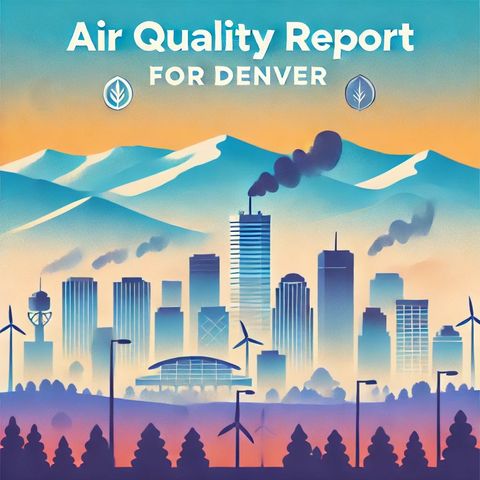Denver Air Quality Fluctuates Between Good and Moderate Levels

Download and listen anywhere
Download your favorite episodes and enjoy them, wherever you are! Sign up or log in now to access offline listening.
Denver Air Quality Fluctuates Between Good and Moderate Levels
This is an automatically generated transcript. Please note that complete accuracy is not guaranteed.
Description
As of today, Denver is experiencing moderate air quality with levels fluctuating between Good and Moderate categories on the Air Quality Index scale. The primary contributors to the city's air...
show moreParticulate matter, especially PM2.5, is a concern for Denver due to its ability to penetrate deep into the lungs, leading to respiratory issues. Current levels are not hazardous but are higher than usual due to a combination of local traffic emissions and dust from dry conditions. Authorities have recommended that sensitive groups such as children, the elderly, and those with respiratory conditions limit prolonged outdoor exertion.
Ground-level ozone remains another significant factor. Unlike the ozone layer high in the atmosphere that protects us from ultraviolet rays, ground-level ozone is harmful, formed when pollutants emitted by cars and industrial facilities chemically react in the presence of sunlight. Denver often faces increased ozone levels during sunnier and warmer days. Today, the relatively mild temperatures are helping keep ozone levels in check, but residents are advised to monitor forecasts as these can change with weather patterns.
Regional wildfire activity also affects Denver's air quality. Smoke from wildfires, sometimes hundreds of miles away, can travel to the city, exacerbating PM levels. Currently, there are no immediate wildfire threats impacting Denver's air, but the city remains vigilant, particularly during the dry, late-summer months.
The city has made strides in recent years to improve air quality through the promotion of public transportation, implementation of stricter vehicle emission standards, and encouragement of bicycling and walking. Initiatives like ozone action alerts encourage residents to reduce driving, fuel vehicles after dark, and maintain energy-efficient practices during high pollution days.
Residents can stay updated on air quality by checking the Colorado Department of Public Health and Environment's daily advisories. Utilizing air quality tracking apps can also help individuals plan outdoor activities more effectively, ensuring they remain healthy while enjoying Denver's natural beauty.
Today's air quality situation underscores the ongoing balance between urban development, environmental conditions, and community health. As Denver continues to grow, strategies to improve air quality and reduce pollution impacts are crucial in fostering a healthy living environment for its residents.
Information
| Author | QP-5 |
| Organization | William Corbin |
| Website | - |
| Tags |
Copyright 2024 - Spreaker Inc. an iHeartMedia Company
